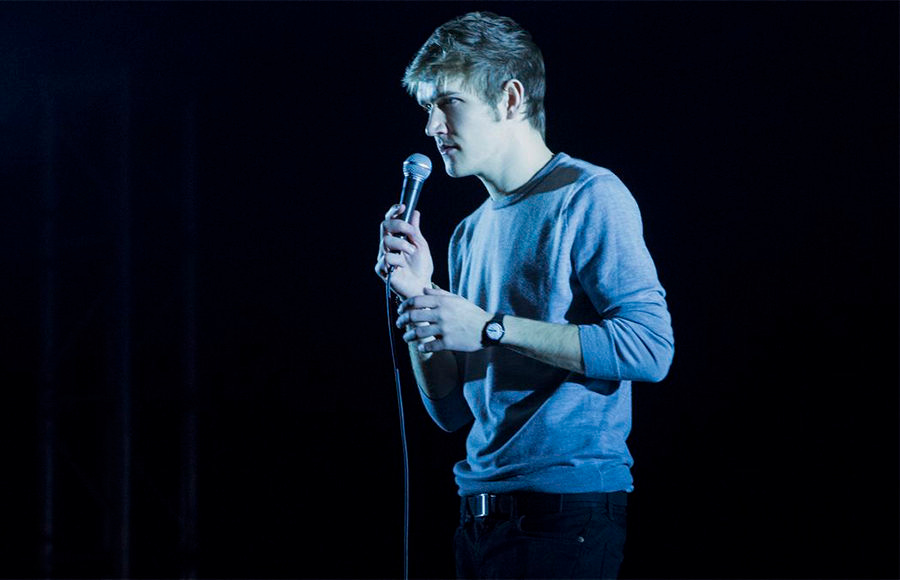Bo Burnham and a cameo of happiness.
Kanye rants, anxiety, and the insatiable search for meaning and happiness.
This article was originally written for Mockingbird.
The other day I was poking around YouTube, as one does during quarantine, and I came across the incredible concluding segment to Bo Burnham’s 2016 Netflix comedy special, Make Happy, in which Bo rants in Kanye’s rhythmically sonic fashion for seven-odd minutes about Pringles, Chipotle, and mental health. If that’s the weirdest sentence you’ve read in a while, that’s only to prepare you for what’s in store. (Fair warning: this clip contains some mature language.)
You might be familiar with Bo Burnham by this point. He has recently come off significant success from his directorial debut with 2018’s Eighth Grade — a film he not only directed but wrote. My first introduction to Bo was actually through a 2018 piece in The New Yorker by Michael Schulman profiling Bo as part of Eighth Grade’s press junket. The profile offers a number of insights into Bo’s career and his battles with anxiety and mental health. In fact, Eighth Grade is itself a film that gives voice to all the anxiety he’s endured in the form of a 13-year-old middle school girl. “I did not set out to write a movie about eighth grade,” Bo confesses. “I wanted to talk about anxiety — my own anxiety — and I was coming to grips with that.” Indeed, Bo has remained transparent about his own struggles with anxiety and panic attacks, sometimes manifesting in public, sometimes on stage in the middle of a show.
Nevertheless, I think about Bo’s “Kanye rant” a lot. Whenever it appears in my YouTube suggestions, I find myself watching it. I am captivated by it, mesmerized even — not only by its cleverness but more so by its rawness. There’s something so disarming in seeing another person disclose the deepest parts of themselves. You’d be hard-pressed to find a more vulnerable comedian performing on stage than Bo Burnham in Make Happy, especially in the last fifteen minutes. It all culminates in the “Kanye rant.” That’s when you realize that the smorgasbord of skits and gags and off-beat routines that have provided (often uncomfortable) laughs for the past fifty-odd minutes are not just skits and gags and off-beat routines meticulously crafted and scripted to maximize comedic effect (which they are). They are insights into Bo’s psyche. They are an introspective tour into the war which rages inside his soul. The skits and gags and off-beat routines, then, are his anxieties manifest on stage. The entire show, then, serves as a living parable of Bo’s own quest for happiness through comedy. Bo’s most clairvoyant remark comes when he opines his “love-hate relationship” with the crowd in front of him who has come to watch a performer with steadily declining mental health attempt to give them what he cannot give himself. Namely, happiness.
These thoughts were marinating when I stumbled upon the Cameo app, the latest exhibition of humanity’s insatiable thirst for happiness, meaning, and self-worth through the ache of recognition. The essential premise of the Cameo app is to provide a platform through which a “regular person” can procure the “happy birthday” or “well wishes” or daily encouragement from a person that matters. Namely, celebrities. For a wage, you can be told that you matter. Want to feel like you have meaning? No worries, just drop $300 and you can have Ray Lewis motivate the crap out of you. Or if that’s too much, for $295 you can have Sean Astin pick you up with a motivational word or two. Or if you’ve been striking out on the dating scene lately, for only $375, you, too, can have Chris Harrison “give you his final rose.” Or for $600 (!) you buy whatever the heck is on Dennis Rodman’s mind at the time.
There is, perhaps, no more thinly veiled human experiment in existence than this one: buying meaning through an app. Meaning can be coded and procured, or so Cameo’s developers would have you believe. The fact that this app exists almost has me wondering which alternate Community timeline we’ve jumped on. That or which Black Mirror episode we’re in. At any rate, this venture for meaning is rickety at best. It flimsily stands on the premise of a societal edifice of personal brands and celebrities that finds itself burning at the moment, like the rest of the world.
As someone who has only dealt with panic attacks second-hand, I cannot offer much in the way of personal experience. I wish I had more eloquent and insightful words to offer when it comes to the pursuit of happiness and the age of anxiety and how to cope with it all. But what I can tell you is that there’s Someone who has already affirmed your self-worth and bought your happiness, and he died paying for it so you wouldn’t have to. There is a Guy who can give you what you cannot give yourself. And he does all this for free.



